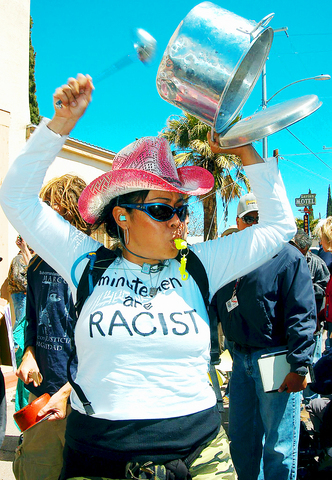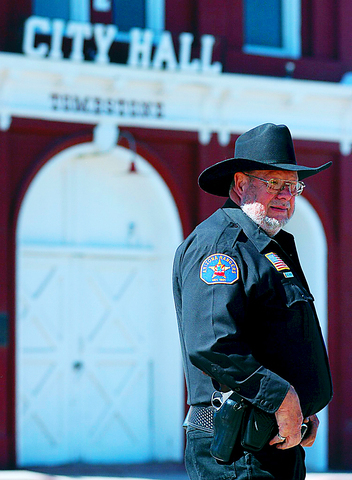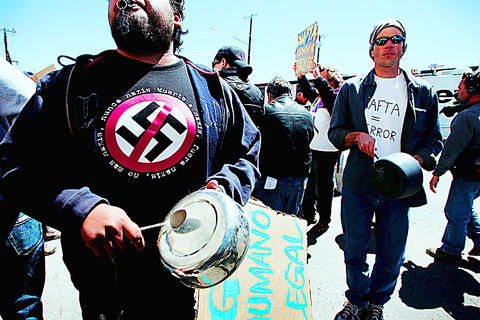Until recently, the parched, dusty town of Tombstone, Arizona, was best known for the brief but savage mayhem portrayed in the classic 1957 Western Gunfight at the OK Corral.
But these days, visitors to Tombstone are not much interested in its tacky tourist attractions like "Helldorado" or plastic figures of heroic sheriff Wyatt Earp, who is credited with bringing law and order to the Wild West.
Tombstone is now the site of a new showdown -- between thousands of undocumented immigrants and hundreds of volunteer Americans from all walks of life who have gathered there to patrol the border with Mexico for a month.

PHOTO: EPA
Suddenly, the Sonoran Desert backwater has become a flashpoint for one of the most complicated issues facing America and many other Western countries where economic and social opportunities are attracting an unrelenting tide of undocumented newcomers.
Activists on both sides acknowledged that there are no easy answers. With dwindling populations unwilling to perform many menial tasks for low wages, industrialized countries need immigrants from poorer countries, who have become a vital part of their labor forces.
In the US, the population of illegal immigrants surged to more than 10 million last year, according to a new study from the Pew Hispanic Center. These undocumented workers represented about one-third of the foreign-born population in the US. Nearly 6 million of them are from Mexico.

PHOTO: EPA
Last year, authorities arrested about 1.2 million Mexicans trying to cross the border without permits. About half of those arrests came in the 60km stretch of the 2,000km US-Mexico border around Tombstone known as the San Pedro River Valley.
That's why hundreds of the controversial volunteers have now converged there. Calling themselves the Minutemen, after the militia that helped repel the British during the American Revolution, many are armed with shotguns and pistols and are equipped with night-vision goggles, coolers of beer and lounge chairs that they set up beginning this past week at lookout points over some of the most popular smuggling routes.
Most of the time, there is little to do but drink the beer and complain about how immigrants are ruining the country.

PHOTO: AFP
"They're costing us billions [of dollars] in health care," said Ted, a stout 64-year-old contractor who was wearing a cowboy hat and had a shotgun propped up against his lawn chair "just in case."
"I'm not racist, but the situation can't go on," added Chip Johnson, who had made the trip to the border from Utah. "We need order at the border."
The immigrants themselves were few and far between. Reports from Mexico said smugglers who are paid an average of US$1,500 dollars per head to sneak people across the border are steering clear of San Pedro and using other routes.
The Minutemen are under strict orders not to use violence and not even to approach anyone they believe to be an "illegal," as they call the immigrants. They are to simply alert the Border Patrol. So far, no violence has been reported, but there have also been few apprehensions.
Nevertheless, the Minutemen claimed that merely by focusing attention on the problem, their mobilization had succeeded. They even claimed credit for a government decision to position 500 new agents on the Arizona border.
"We know we are not a panacea, that we are not going to change all this in 30 days," says Minuteman founder James Gilchrist, "but we have already accomplished our goal 100-fold by getting the media out here and getting out the message."
Their critics, however, maintained that the move is counterproductive.
"They have a lynch-mob mentality," said Ray Borane, mayor of the border town of Douglas, whose population is mostly Latino. "They have no training and no sensitivity."
President George W. Bush has called them "vigilantes," and the Border Patrol also views the volunteers as a menace and is concerned that they could set off ground sensors, complicate video surveillance and create security problems.
"Having a large number of people walking about the migrant trails is not beneficial," spokesman Rob Griffin said.
In Mexico, where the local media portrayed the Minutemen as trigger-happy "migrant hunters," reports said Mexican authorities have beefed up patrols on their side of the border and have posted flyers at migrant hotels instructing immigrants to go to other places.
Meanwhile, on the other side of the border, Los Angeles Times columnist Steve Harvey insisted that the Minutemen are focusing on the wrong target.
"The posse went the wrong way," he wrote. "It should ride to Wal-Mart, which hired illegal immigrants to clean the floors ... to the farms that have hired illegals to cut costs. It should ride to Washington, where Congress sees a few thousand dead border crossers as a small price to pay for an endless supply of cheap labor."
Ultimately, people on both sides of the argument agreed that the only solution can come from legislation that would legalize the flow across the border. Bush has talked often about a temporary migrant-worker scheme but has so far been blocked by more conservative members of his own center-right Republican Party who fear that the measure and the workers it would legalize would eventually become permanent residents of the country.
The more immediate danger, however, is that some of the Minutemen would clash with a band of well-armed smugglers and set off a bloody battle. Luckily, that has not yet happened.
The worst case so far has been when three Minuteman, including a man named Bryan Barton, forced a 26-year-old migrant to pose for a picture with a T-shirt that read, "Bryan Barton caught an illegal alien and all I got was this T-shirt."

On April 26, The Lancet published a letter from two doctors at Taichung-based China Medical University Hospital (CMUH) warning that “Taiwan’s Health Care System is on the Brink of Collapse.” The authors said that “Years of policy inaction and mismanagement of resources have led to the National Health Insurance system operating under unsustainable conditions.” The pushback was immediate. Errors in the paper were quickly identified and publicized, to discredit the authors (the hospital apologized). CNA reported that CMUH said the letter described Taiwan in 2021 as having 62 nurses per 10,000 people, when the correct number was 78 nurses per 10,000

As Donald Trump’s executive order in March led to the shuttering of Voice of America (VOA) — the global broadcaster whose roots date back to the fight against Nazi propaganda — he quickly attracted support from figures not used to aligning themselves with any US administration. Trump had ordered the US Agency for Global Media, the federal agency that funds VOA and other groups promoting independent journalism overseas, to be “eliminated to the maximum extent consistent with applicable law.” The decision suddenly halted programming in 49 languages to more than 425 million people. In Moscow, Margarita Simonyan, the hardline editor-in-chief of the

Six weeks before I embarked on a research mission in Kyoto, I was sitting alone at a bar counter in Melbourne. Next to me, a woman was bragging loudly to a friend: She, too, was heading to Kyoto, I quickly discerned. Except her trip was in four months. And she’d just pulled an all-nighter booking restaurant reservations. As I snooped on the conversation, I broke out in a sweat, panicking because I’d yet to secure a single table. Then I remembered: Eating well in Japan is absolutely not something to lose sleep over. It’s true that the best-known institutions book up faster

Though the total area of Penghu isn’t that large, exploring all of it — including its numerous outlying islands — could easily take a couple of weeks. The most remote township accessible by road from Magong City (馬公市) is Siyu (西嶼鄉), and this place alone deserves at least two days to fully appreciate. Whether it’s beaches, architecture, museums, snacks, sunrises or sunsets that attract you, Siyu has something for everyone. Though only 5km from Magong by sea, no ferry service currently exists and it must be reached by a long circuitous route around the main island of Penghu, with the